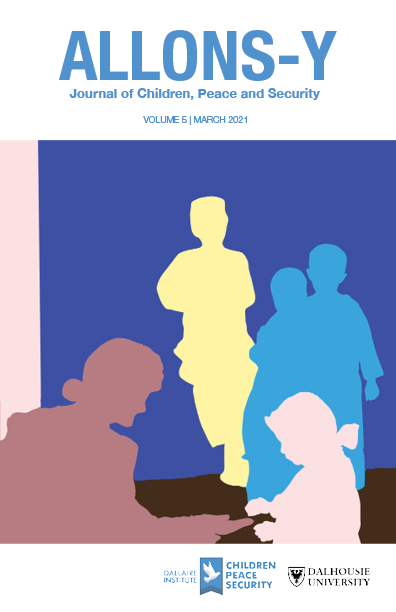Editors' Note
Abstract
“National and international strategies to protect children must empower and build the capacities of women, families and communities to address the root causes of conflict and strengthen local development.” –Graça Machel[1]
Over this past year we saw events, reflections, and new research on the 20th anniversary of UN Security Council Resolution 1325 on women, peace and security, and the 25th anniversary of the Beijing Platform for Action. Critical dialogue has continued on the roles of men and women in peacekeeping and gaps remain in our collective understanding of how gender influences peacekeeping practice. The Vancouver Principles on Peacekeeping and Preventing the Recruitment and Use of Child Soldiers, now endorsed by over 100 countries, raises particular attention to the intersections of gender and child protection practice and policy. Principle 11, Contributions of Women, aims “to recognize the essential contribution of women to peacekeeping operational effectiveness, and the distinct and critical roles of both men and women in the protection of children and the prevention of the recruitment and use of child soldiers.”
Thus, for this 5th volume of Allons-y, we called on the international community to consider the interconnections between the Women, Peace and Security and Children, Peace and Security agendas to explore how gender influences the prevention of the recruitment and use of children in violence. The contributors are researchers and practitioners with extensive experience working in the fields of child protection, security sector reform, and feminist scholarship. Together, the contributions in this volume demonstrate the complexities of the humanitarian, development and security nexus, and the importance of understanding the complexities of gender within peace and security.
In the opening preface, Clare Hutchinson, the NATO Secretary-General‘s Special Representative for Women, Peace and Security, reflects on the evolution of formal mechanisms designed to address the gendered impacts of conflict and the importance of enhancing women‘s meaningful engagement in peace and security. Nidhi Kapur and Hannah Thompson argue that the complexities of gender, beyond a binary perspective, need to be considered in child protection, not least in the context of fragile and conflict environments if peace is to be sustained. Vanessa Brown argues for reforms to military training that prioritize the protection of children affected by conflict and considers an intersectional, gendered analysis as essential to effective military operations. Dustin Johnson analyzes Vancouver Principle 11 – Contribution of Women – in relation to the emerging complexities of a gender transformative approach to child protection.
The Vancouver Principles are an important mechanism to prioritize children within peace and security. Recognizing that conflict and conflict prevention are gendered social issues that require a commitment to critical dialogue, reflective practice, and evolving protection frameworks, are essential to a comprehensive approach to protecting children. The contributions in this volume particularly demonstrate the importance of applying theory to practice, and illustrate the value of using critical and feminist approaches in scholarship to tackling the complexities of gender, peacekeeping, and, child recruitment. We hope this 5th volume of Allons-y serves to challenge understandings and practices in order to improve child protection and the prevention of the recruitment and use of children as soldiers.
[1] Graça Machel, “Impact of Armed Conflict on Children” (New York: United Nations, 1996), 59, https://www.un.org/ga/search/view_doc.asp?symbol=A/51/306.





